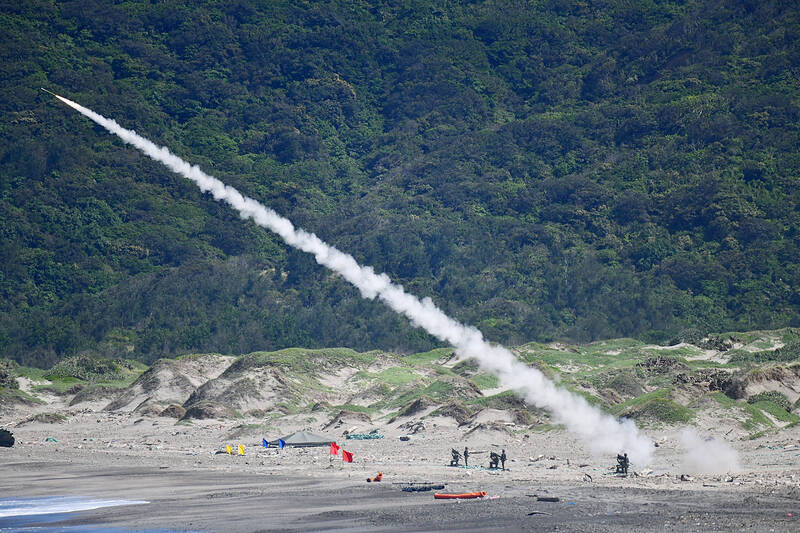The army has placed an order with the US for thousands of FIM-92 Stinger missiles worth NT$11.02 billion (US$358.91 million) on top of a previous order by the Ministry of National Defense for 2,621 Stinger systems for NT$69 billion, a military source said yesterday.
The army ordered the missiles to increase its stores, while the ministry purchase was to procure arms and support equipment, the source said.
Taiwan is one of the few countries that deploy the entire Stinger family of products, including Man-Portable Air Defense Systems (MANPADS), the Dual-mount Stinger system, the AN/TWQ-1 Avenger Air Defense System and helicopter-launched Stinger missiles, the source said.

Photo: Tsai Tsung-hsien, Taipei Times
The army’s purchase was likely to top up its stores for the Dual-mount, the Avenger and the helicopter-launched systems, they said.
The MANPADS, which were used in the Han Kuang exercises, were provided by the US as part of its military aid package and were not part of foreign arms procurement deals, the ministry said.
The first batch of 500 missiles in the ministry purchase is expected to arrive by the end of the year, with the shipment to be divided between the navy and the army, the source said.
The remaining systems would be delivered in installments, with the army expected to receive 1,985 missiles, 549 launchers and 549 Identification Friend or Foe (IFF) systems by 2031, they said.
The navy is expected to receive 45 missiles, 15 launchers and 15 IFF systems in the same year, they added.
Meanwhile, the ministry’s budget for this year shows that the air force has NT$4.9 billion to purchase Hsiung Sheng (雄昇) missile launcher trucks and 11 other items across six years.
The Hsiung Sheng missiles, approved for small-scale production with a budget of NT$17 billion, has a range of 1,000km and would bolster the military’s countermeasure capacity against China.
Separately, the ministry is also bolstering its logistics capabilities.
An announcement on the E-Procurement Web site said that it has inked a deal with the American Institute in Taiwan to purchase the M232A2 Modular Artillery Charge System (MACS).
The MACS uses an incremental “build a charge” system in which components are combined in specific numbers for different firing zones, providing the propellant for weapons such as M109A2 self-propelled howitzers.
Additional reporting by Aaron Tu

FOUR DESIGNATED AREAS: Notices were issued for live-fire exercises in waters south and northwest of Penghu, northeast of Keelung and west of Kaohsiung, they said The military is planning three major annual exercises across the army, navy and air force this month, with the navy’s “Hai Chiang” (海強, “Sea Strong”) drills running from today through Friday, the Ministry of National Defense said yesterday. The Hai Chiang exercise, which is to take place in waters surrounding Taiwan, would feature P-3C Orion maritime patrol aircraft and S-70C anti-submarine helicopters, the ministry said, adding that the drills aim to bolster the nation’s offshore defensive capabilities. China has intensified military and psychological pressure against Taiwan, repeatedly sending warplanes and vessels into areas near the nation’s air defense identification zone and across

FORCED LABOR: A US court listed three Taiwanese and nine firms based in Taiwan in its indictment, with eight of the companies registered at the same address Nine companies registered in Taiwan, as well as three Taiwanese, on Tuesday were named by the US Department of the Treasury’s Office of Foreign Assets Control (OFAC) as Specially Designated Nationals (SDNs) as a result of a US federal court indictment. The indictment unsealed at the federal court in Brooklyn, New York, said that Chen Zhi (陳志), a dual Cambodian-British national, is being indicted for fraud conspiracy, money laundering and overseeing Prince Holding Group’s forced-labor scam camps in Cambodia. At its peak, the company allegedly made US$30 million per day, court documents showed. The US government has seized Chen’s noncustodial wallet, which contains

SUPPLY CHAIN: Taiwan’s advantages in the drone industry include rapid production capacity that is independent of Chinese-made parts, the economic ministry said The Executive Yuan yesterday approved plans to invest NT$44.2 billion (US$1.44 billion) into domestic production of uncrewed aerial vehicles over the next six years, bringing Taiwan’s output value to more than NT$40 billion by 2030 and making the nation Asia’s democratic hub for the drone supply chain. The proposed budget has NT$33.8 billion in new allocations and NT$10.43 billion in existing funds, the Ministry of Economic Affairs said. Under the new development program, the public sector would purchase nearly 100,000 drones, of which 50,898 would be for civil and government use, while 48,750 would be for national defense, it said. The Ministry of

SENATE RECOMMENDATION: The National Defense Authorization Act encourages the US secretary of defense to invite Taiwan’s navy to participate in the exercises in Hawaii The US Senate on Thursday last week passed the National Defense Authorization Act (NDAA) for Fiscal Year 2026, which strongly encourages the US secretary of defense to invite Taiwan’s naval forces to participate in the Rim of the Pacific (RIMPAC) exercise, as well as allocating military aid of US$1 billion for Taiwan. The bill, which authorizes appropriations for the military activities of the US Department of Defense, military construction and other purposes, passed with 77 votes in support and 20 against. While the NDAA authorizes about US$925 billion of defense spending, the Central News Agency yesterday reported that an aide of US